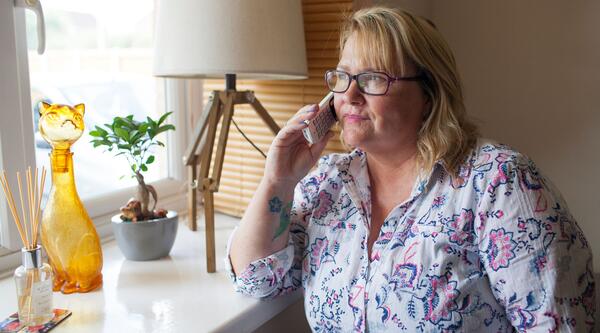How can dementia affect a person’s sexual behaviour?
Dementia can affect a person's sexual behaviour, sometimes meaning they are less or more interested in sex. Partners of a person with dementia may also feel differently about sex and intimacy. Find out how to manage these changes.
Sex, intimacy and dementia
- How does dementia affect sex and intimacy?
- Sexual health and dementia
- Consenting to sex and intimacy after a dementia diagnosis
- You are here: How can dementia affect a person’s sexual behaviour?
- Dementia and challenging sexual behaviour
- Maintaining your relationship after a dementia diagnosis
- Sex and intimacy in care homes
- What to do if you suspect sexual abuse
The brain controls all our behaviour and emotions, including our sexual feelings and inhibitions. This means a person with dementia may have more or less sexual feelings than usual, and may do or say inappropriate things as a result.
Because dementia affects the brain, the sexual desires and feelings of a person with dementia can change unpredictably.
Depending on which parts of the person’s brain are affected and what medication they are taking, a person with dementia may experience:
- more, less, or no interest in sex
- more, less, or no ability to perform sexually
- changes in sexual responses – for example, appearing less sensitive to the needs of their partner
- changes in levels of inhibitions – the person may do or say things that are out of character and which may be inappropriate
- becoming sexually aggressive – see ‘Challenging sexual behaviour’ for more information on this.
If your partner experiences one or more of these symptoms, you may feel able to adapt relatively easily. However, it is common for one or both partners to feel a sense of loss, anger, embarrassment, frustration or anxiety about these changes. These are normal reactions, so try not to feel guilty about this.
For more support on coping see ‘Coping with changes to your sex life’ on the How does dementia affect sex and intimacy page.
How can dementia affect a person’s sexual behaviour?
How these changes can affect partners
If you are the main carer for your partner, your role as a carer and the changes in the person’s behaviour can affect your desire for sex and your feelings. Partners of people with dementia describe a wide range of feelings about their sexual relationships. Some people find that they and their partner still enjoy sex. Others describe feeling a sense of confusion at being touched by someone who, at times, can seem like a stranger.
Many people who provide personal care for their partner with dementia can find it awkward to do this as well as being the person’s sexual partner. You may find that you feel different emotions at different times, particularly as the person with dementia’s condition progresses.
You might relate to any of the following experiences:
- Your feelings may not change towards your partner at all. You can connect with your partner through sexual activities even if they are finding it difficult to communicate in other ways.
- You feel exhausted by your caring responsibilities and lack the energy to enjoy sex. This can be frustrating for both you and your partner.
- Helping your partner with physically intimate tasks, such as bathing or helping use the toilet, can put you off the idea of sex. This can feel isolating for you both, and you may feel guilty about how you feel about your partner.
- If many aspects of your relationship besides sex have changed, you might find it hard to enjoy a sexual relationship. You may feel that the sex doesn’t have as much emotional meaning.
- Having sex is difficult as your partner with dementia may not be as considerate or responsive as they used to be. If this is the case, looking at new ways to be intimate can be helpful, and you might find that other forms of intimacy or sexual activity could be more fulfilling.
- If your partner develops an increased appetite for sex, or you don’t feel like having sex, you might frequently have to turn down sexual requests and you may feel a sense of guilt.
Dementia affects people in different ways, and everybody is different. However, it can still help to get support and advice, and talk about how you are feeling.
You could talk to:
- friends and family – if possible, talk to someone who you feel close to and might understand
- your GP, social worker or community nurse – they may be able to explain why dementia is causing particular changes to you or your partner
- a counsellor or therapist – you and your partner may be referred through your GP, or contact the British Association for Counselling and Psychotherapy.
- a support line or helpline adviser – you can call Alzheimer’s Society on 0333 150 3456 for information and advice, as well as information on other organisations that could help
- a carers’ support group – you may find it helpful to discuss how you feel with other carers, who may be experiencing similar emotions. In some areas, carers’ centres also offer opportunities to talk to someone in private. Search for a group near you with our dementia directory
- online support groups – Alzheimer’s Society’s online community, Talking Point, is for carers and people with dementia to share their feelings and experiences with people who understand.





Some people with dementia lose interest in sex – something that can happen at any stage of the condition. If your partner has lost interest in sex, you might feel frustrated, but it is important to respect their reduced interest.
You could look at other ways for you both to be intimate together. For example, your partner may still enjoy being stroked, hugged or kissed, even if they are no longer able to initiate affection themselves. If you miss the intimacy of sex, these expressions of affection can continue this feeling of intimacy between you.
You might find it helpful to discuss the emotions you may be feeling – such as frustration, anger and loss – with a family member, friend, or counsellor. See ‘How these changes can affect partners’ below.
Sometimes a person with dementia will have an increased interest in sex. For some partners, this may be a positive change. Sometimes, however, partners feel unable to adapt to an increased desire for sex, which can be difficult for both people in the relationship.
Some partners have said that they feel wary of showing any affection at all, in case it is mistaken for a sexual advance by their partner with dementia.
Most importantly, remember you do not have to do anything you do not feel comfortable and happy doing. If you feel that you or another person is in danger then seek help straightaway. This might include calling the police.
Repeated demands for sex can be a person’s way of expressing that they need intimacy, and not that they necessarily want sex. If your partner’s level of sexual interest starts to feel overwhelming, it can help to talk to someone outside of the relationship.
It could be helpful to find something else that might meet their need for intimacy. This could either be something that your partner does alone such as masturbation, or something that you could do together such as kissing, touching or other forms of physical intimacy.
When you turn down requests for sex, try and do so in a way that acknowledges the person’s sexual needs. They may feel embarrassed or rejected. Some people with dementia may become aggressive if turned down for sex – see ‘Challenging sexual behaviour’ for more information on coping with this.
Ask your GP or consultant for advice if you find that your partner becomes aggressive, or if you have any concerns. They may be able to suggest ways for the person with dementia to meet their needs in a way which doesn’t impact on your wellbeing. This could include masturbation as well as non-sexual activities which might help meet the person’s need for intimacy or social interaction, such as activity groups. They may recommend medication to reduce aggression, if they feel this is appropriate.